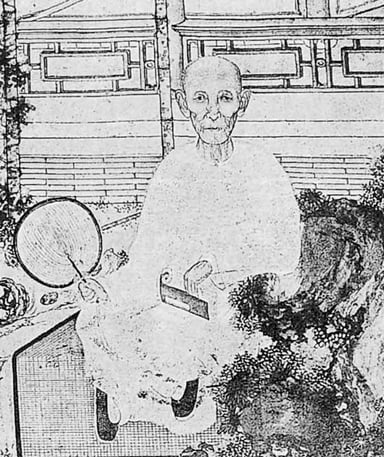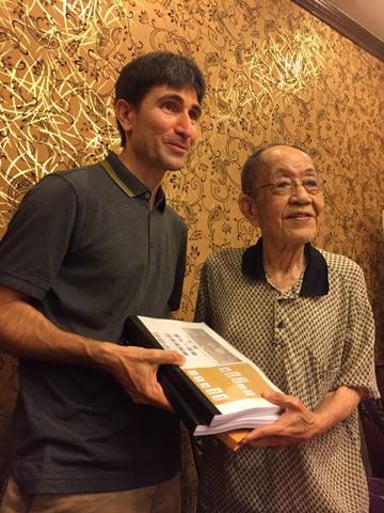Heavenly Purpose in Heart Kindness
Centuries ago in China, lived a Confucian scholar, educator, healer, an exemplary son and a model parent named Liu Yuan, who believed in bridging gaps between religions and people. He expounded on the common goodness possessed innately by all people and the need to rediscover it when obscured. At the heart of his teachings was the Huai Xuan (Locust Tree Canopy) doctrine.
During Liu Yuan’s time, his teachings have already spread far and wide to other provinces and countries. He was respectfully named The Master from Western Sichuan and since his disciples were found in and out of Sichuan province, people often called them collectively Huai Xuan School of Thought as well as the Liu School.

The Huai Xuan doctrine promotes innate goodness of the person–the human. It transcends geographical borders and cultural differences as it brings together all humanity. In fact, when it teaches Kindness and practical applications, it adapts to the local culture and common customs, and uses simple words and accepted ideas that everyone can understand. Its main premise explains that life’s miracle is found in every human relation and every simple action.
Fast forward to modern times, a Chinese culture scholar and healer and the founder of Hunyuan Life, Dr Yaron Seidman was introduced to Liu Bogu, Liu Yuan’s great grandson and the current standard bearer of the Huai Xuan School, who shared the Huai Xuan life philosophy and practice. Dr Seidman went on to become a Huai Xuan advocate, actively promoting it around the world.
Following is a sample Huai Xuan spiritual text, in the early 19th century:

Learning the Sages’ Capacity for Forgiveness
1. A Great Compassionate Heart
Feeling compassion for others is benevolence; benevolence is the human heart. It is a Heavenly Purpose in Heart Kindness.
People must first be benevolent and only then can they think thoughts and handle affairs properly. Only then can they become aware of a person’s good and evil and, with each of their words and actions, can they be concerned about forgoing others.
With human relations there should be loyalty, filial piety, friendship and brotherly love and there should not be deception, laziness and recklessness, and other than that there is no extra explanation needed!
A benevolent person, who is also compassionate, begins initially the practice with one thought and then increases his skill until it is with all his thoughts, begins with one affair and then with all his affairs. This progression should be drilled into the intolerant heart, allowing it to gradually inflict no harm even upon insects and vegetation. This allows the person then to fulfil his true nature and his human nature and, in effect, the nature of all things assisting in the creation of life. This is the root for everything.
2. A Great Vast Heart
Vast refers to selflessness. The ancients said: “when one is selfless he is having good fortune.” But, when selfish, one’s heart harbors narrow mindedness; he sees Heaven’s Purpose and yet he cannot understand it. One’s temperament is agitated and his knowledge is limited to what benefits himself. One does not recognize needs of others, instead, he thinks only about profiting himself not caring about harming others. In such a case, one is self-assured and yet does not promote kindness, self-centered and yet does not forgive others, selfish and yet is intolerant of others.
For one to be selfless, he must self-reflect all day. With every word and action he will worry about neglecting Heaven’s Purpose, he will worry about hurting others. This is why he will examine himself every single moment.
Even though other people may be angry with him, scold him and treat him unfairly, he will not pay attention. He will rest at home reflecting and asking himself, asking his heart: was shame introduced? Did he add an unjust action in addition to the one done to him? All those wrong actions done toward him he will completely ignore.
With those other important human relations including government, parents, brothers and friends, he will submit to an insult without retaliation, since his goal is to promote Heaven’s Purpose and harmony!
3. A Great Heart At Ease
What does ‘at ease’ mean? It means being flexible with handling affairs and courageous with acting properly.
People get along with each other and co-habit this world, they interact and welcome each other and this is the meaning of human relations. However, within human relations there are variations such as less or more compassion, superior and inferior position, intimate and remote relations and the capacity to have greater or lesser virtue.
But regardless of such variations, in public office or in the family one should serve the country and help the parents with only utmost and wholehearted respect. When superior government officials and parents are virtuous, subordinates and children can mirror their virtue. But when government superior officials and parents are not virtuous, one should remonstrate in order to correct their error. One should carry out such remonstration in a thoughtful fashion causing the superior official and parents to become sagely. This is the meaning of being loyal and filial. In this respect, there is no difference between ancient and modern times. It is the duty of the official’s subordinates and of the children. Without this skill of subordinates helping their superior, public officials and children helping the parents, the heart cannot be described as ‘at ease’.
Other than serving the country or helping parents, other relations such as siblings and friends, amongst which kinship may be close or far, virtuous or not, one cannot be indifferent or view them as equal.
In these relationships, serving an older brother, loving a younger or trusting a friend, one must first cultivate his own Self and then love, respect, and not deceive the other. A Huai Xuan practitioner aspires to be like this without compromise, even when the other criticizes him; he focuses only on his own heart to become good.
To fulfill a purposeful heart, as long as it is not contrary to Heaven’s Purpose, the practitioner’s sincere heart will assist the labor of another person. Whole heartedly, he will help the other turn a good affair. This is the Dao of ‘at ease’.
As long as one pays attention, not being lazy or reckless, he can feel at ease in all situations. For example, when he walks on the street and sees a rock or tree obstructing the road, he will remove it effortlessly as he is worried it will obstruct others. He will be concerned about hardships like hunger and cold afflicting others and he will aspire for enough to eat, warmth and safety for others. At any time and in every place he feels at ease. This word ‘at ease’ encompasses the two words ‘benevolence and righteousness’.
4. A Great Purified of illusion Heart
What does ‘purified’ mean?
One does not love money or lust. Instead of desires one follows Heaven’s Purpose. He is law abiding and diligent in his profession, cultivates his heart, contemplates human life in every step and understands that it is all part of his purpose in this world. ‘Heaven loves man’ is reflected in the concept Heavenly Purpose in Heart Kindness. Every thought reflects that.
Regardless of the agenda, the practitioner, who lives and works in society, elects one course of action that conforms to Heaven’s Purpose in every aspect. For example, if I work as a merchant, I focus on learning this art, I am diligent without slacking, industrious but not excessive, honest and not greedy. I focus without scattering on the job and yet carefully examine each of my thoughts, not losing even a little bit the Heaven Kindness.
When the practitioner acts like this, no matter what the situation is like, he can make a living and pass his days with dignity and joy. It becomes a habit for him to rely on heaven for his actions.
Now, the human heart tends to go astray endlessly, and therefore one cannot conduct himself unrestrained and unchecked. It is important to remember that as long as one does not suffer hunger or cold and as long he is able to provide for his family to have enough, then it is a beautiful realm.
As for wealthy and famous people, who also accumulate goodness and virtue, those that heaven has blessed with riches and good fortunes, the practitioner does not possess their accumulations, so how could his thoughts go astray as if he was them? Sure enough, intentionally he retreats interest from wealth and glory. He constantly eradicates stray thoughts, and so over time it becomes the rule. Then no matter if he is poor or in difficulty, with a calm heart he keeps on going. This is how one makes oneself study the method of purification.
When an educated and enlightened person is able to preserve his heart and nurture his true nature, step with benevolence and pace with properness, be kind to everyone under all circumstances, then after a while whatever vulgarity he had it naturally disappears, external heart movements naturally follow propriety, and, after some time, the feeling of good and bad completely vanish and only kindness remain.
The two words ‘pure heart’ represent, at the highest level, aspiration to be like the sage, next to that – it represents guarding one’s actions and conducting oneself with restraint, next to that – it speaks of heart emotions being like water, they adapt naturally to any circumstance. For some, the heart could be like this naturally, but for most people it becomes like this only with effort.
5. The Great Gentle Harmonious Heart
Harmonious speaks of a kind friendship extending everywhere. In effect, it means the practice of joy, anger, sorrow and happiness all being regulated by center; by the kindness of heaven. Heaven and earth action over human life was always equal for all generations and all people. A sage is a regular person able to embody the ultimate of this ‘harmony’.
Next to Heaven’s effect over people come human relations, each with its principle and proper place. To express Heaven, kindness should be present and friendship prevalent, and ties should not be deviated from. This is harmony’s vital importance that one cannot do without. It is what a person should explore to the fullest extent.
The practitioner in handling relationships should be modest and compromising, and when there is an affair of great unfairness or something that he cannot tolerate, someone who is really hated or offensive, then he passes by in silence. If at home there is great competitiveness or anxiety, with great vigor he softens it and calms it down, and therefore it is called a gentle and harmonious heart.
Whenever a person cannot endure humiliation or tolerate rejection it is because his own blood and Qi are stiff and unyielding and his emotions are agitated and explosive. Therefore, he must soften his Qi in order to follow Heaven’s Purpose, make his emotions harmonious in order to become compatible to others, only then can kinship and friendship extend everywhere, and actions may be without disaster.
